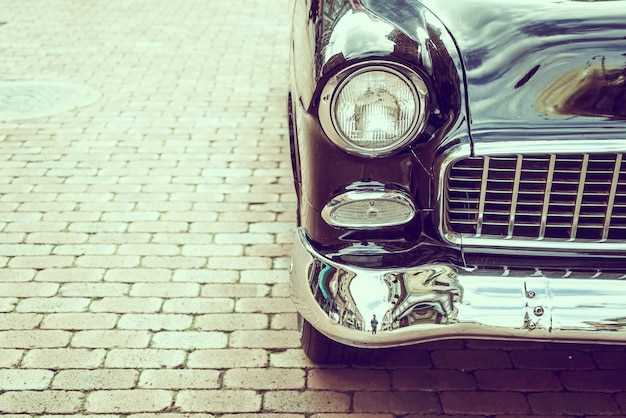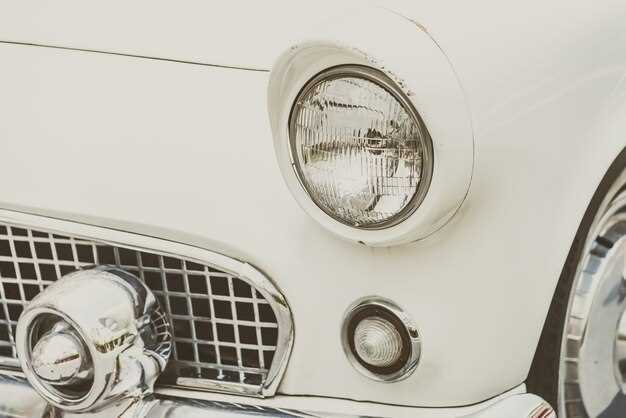Attend local auctions to discover rare classic cars that often slip under the radar. Research auction houses in your area and subscribe to their newsletters to stay updated on upcoming events. Websites like Hemmings and ClassicCars.com list auction dates and provide insights into featured vehicles, making it easier to identify rare finds.
Evaluate the auction catalog ahead of time. Prioritize cars that match your interests and budget. Look for detailed descriptions, photographs, and historical data that give insights into each vehicle’s condition and provenance. When possible, visit the auction preview days to inspect the cars firsthand, assessing their authenticity and mechanical condition.
Engage with car enthusiasts at these events. Networking can provide leads on unlisted vehicles or insider tips on bidding strategies. Join clubs and online forums that focus on classic cars, where members share their experiences and knowledge, often alerting each other about auctions where rare models might appear.
Set a clear budget before placing bids. Stick to your limits to avoid overspending in the excitement of the auction. Be aware of additional fees such as buyer’s premiums, which can significantly impact the final price. Understanding the auction process can help you make informed decisions and secure that elusive classic car.
Understanding Auction Types and Their Benefits
Be aware of two primary auction types: live and online. Live auctions occur in person, allowing bidders to engage directly with the auctioneer and other participants. This format creates an exciting atmosphere that can lead to spirited bidding. Online auctions, on the other hand, enable convenience and flexibility, allowing you to place bids anytime from anywhere. Assess your preference for interaction versus ease of access when choosing the auction type.
Consider the benefits of a live auction. You get a real-time view of the classic cars, evaluating conditions firsthand. You can gauge the market dynamics as you watch bidders compete. This immediacy often results in better deals if you act strategically. Pay attention to auction previews; they can provide valuable insights into the cars available and competitive pricing.
Online auctions offer wider selections and more time to research each vehicle. You can read detailed descriptions, view multiple photos, and compare similar models. Check for reputable online platforms that cater to classic car enthusiasts. Many platforms offer additional resources, such as inspection reports and historical vehicle data, enhancing your decision-making process.
A hybrid approach combines both auction types, maximizing your chances of finding rare cars. Participating in live auctions while also monitoring online platforms allows you to capitalize on unique opportunities across different venues.
Ultimately, understanding the characteristics and advantages of each auction type empowers you to make informed choices and increases the likelihood of acquiring the classic car you desire. Be proactive, stay engaged, and refine your bidding strategy for the best outcomes.
Researching Upcoming Classic Car Auctions in Your Area
Check local websites and community boards for announcements about classic car auctions. Many auction houses list their upcoming events online, detailing the cars available and their estimated values. Utilize resources like social media platforms to follow car clubs and enthusiasts who often share auction dates and insights.
Subscribe to newsletters from auction houses. These subscriptions provide updates on upcoming auctions and can include exclusive previews of classic cars. Major auction houses often have dedicated sections for classic vehicles, ensuring you stay informed about rare finds.
Visit classic car shows in your region. Networking with other car enthusiasts can yield insider tips on auctions worth attending. Attending these events allows you to interact with experts who are familiar with local auction trends and popular models.
Leverage online auction platforms that specialize in classic cars. Websites such as Hemmings, Bring a Trailer, and Cars & Bids often feature listings with detailed descriptions and expert evaluations. Filtering your search by location can lead you to auction opportunities close to home.
Check local newspapers and specialty automotive magazines that often highlight auctions and feature classic cars. These publications may include insights from industry experts and highlight notable vehicles that will be auctioned.
Join online forums and groups focused on classic cars. Members frequently discuss upcoming auctions, sharing experiences and advice on which auctions to attend based on the types of cars featured and their expected values.
Consider attending auctions hosted by charity organizations. These events can feature unique classic cars, often at a lower competition level compared to major auctions. Plus, you’ll be supporting a good cause while pursuing your passion.
Identifying Red Flags When Inspecting Classic Cars at Auctions
Check for rust on the frame and undercarriage. Use a magnet to identify hidden areas that may have been repaired with filler. Pay attention to any bubbling paint, which can indicate deeper rust issues.
Examine body panels for misalignment. Uneven gaps between doors, hoods, and fenders may signal previous accidents or poor repairs. A consistent body alignment is crucial for both aesthetics and structural integrity.
Inspect the engine for unusual noises. Listen for knocking or ticking sounds that may highlight underlying mechanical problems. Verify the oil color; dark or milky oil could point to serious engine issues.
Look at the tires. Uneven wear patterns can indicate alignment problems or suspension issues. Ensure the tires are appropriately rated for the vehicle and check for signs of dry rot.
Assess the interior for signs of water damage. Musty smells, mold, or warped surfaces indicate leaks or previous flooding. Validate that all gauges and electrical components function correctly to avoid costly repairs later.
Review maintenance records and documents. A well-documented history shows the car has been cared for properly. Lack of records may raise concerns over the vehicle’s reliability and upkeep.
Take note of aftermarket modifications. While some upgrades can enhance performance, others may detract from the car’s value or stability. Evaluate whether these changes conform to vintage standards.
Finally, trust your instincts. If something feels off, don’t hesitate to walk away. There are plenty of classic cars out there, and finding the right one should feel satisfying, not stressful.
Connecting with Auction Experts and Enthusiasts for Insider Tips
Engage directly with auction experts through platforms like online forums and social media groups dedicated to classic cars. These connections can provide real-time insights on upcoming auctions and specific vehicles of interest.
Attend local car club meetings or automotive events to meet fellow enthusiasts who have firsthand experience navigating auctions. They often share tips on bidding strategies, auction etiquette, and even specific auction houses known for their classic selections.
Utilize resources like auction house newsletters and webinars. These frequently offer expert advice on the current market trends and valuation techniques. Signing up keeps you informed about exclusive previews and items that may not be widely advertised.
Consider reaching out to established car restorers or appraisers. Their expertise can shed light on the true value of classic cars, helping you make informed bidding decisions. Establishing a rapport with these professionals may also lead to valuable recommendations on auctions to attend.
If possible, visit auctions in person. Observing the dynamics of bidding and asking questions during the event provides practical insights. Interacting with auctioneers can clarify how bidding increments work and what to expect as a buyer.
Participate in auction preview days. This allows for personal inspection of vehicles and discussions with both sellers and auction staff. Gaining knowledge on the history and condition of cars will enhance your confidence when placing a bid.
Lastly, build a network of contacts within the classic car community. Engage in discussions, share your interests, and leverage their experiences. Networking opens doors to exclusive insights and recommendations that can enhance your auction experience.
Securing Financing Options for Your Classic Car Purchase
Explore loan options from credit unions and banks specializing in classic car financing. These institutions typically offer competitive rates with flexible terms tailored for vintage automobiles.
- Credit Unions: Often provide lower interest rates and more favorable terms compared to traditional banks. Membership is usually open based on specific criteria, such as location or occupation.
- Personal Loans: Unsecured personal loans can be a quick solution. Compare rates from different lenders to find the best option for your needs.
- Classic Car Loans: Some lenders specifically focus on classic car loans. These loans take the vehicle’s unique value into account, which can lead to better terms.
Gather your financial documents, including credit reports, income statements, and any existing debt information. Lenders will review this data to determine your creditworthiness.
- Check Your Credit Score: A strong credit score enhances your chances of securing better financing options. Aim to improve your score if necessary before applying.
- Determine Your Budget: Set a clear budget for your classic car purchase, including maintenance and insurance costs.
- Get Pre-Approved: Seek pre-approval for a loan to understand how much you can afford. This can also give you an advantage at an auction.
Negotiate the terms of your loan. Don’t hesitate to discuss rates and payment options with lenders to find the best arrangement for your purchase.
Factor in insurance costs when assessing your overall financing plan. Classic car insurance can vary significantly, so obtaining quotes from multiple providers is advisable.
Keep an eye on auctions and classified listings for financing-compatible vehicles. Knowing your limits will prevent overspending and help you secure your dream classic car.
Strategies for Bidding Successfully at Classic Car Auctions
Set a firm budget before attending the auction. Clearly define your maximum bid to avoid overspending. This will help maintain focus during bidding and minimize impulse decisions amidst the excitement.
Research the auction items in advance. Familiarize yourself with the history, market value, and condition of the classic cars you’re interested in. Knowing the details equips you with leverage during the bidding process, allowing you to make informed decisions.
Arrive early to inspect the vehicles. Take your time to assess each car, checking for authenticity, condition, and any potential issues. Engaging with existing owners or previous bidders can provide valuable insights and build rapport with fellow enthusiasts.
Establish a pre-bidding strategy. Consider how you’ll approach the auction–whether you’ll bid aggressively, wait for the right moment, or engage in tactics like bidding in small increments to draw out competitors. Tailor your approach based on the auction atmosphere.
Observe the bidding dynamics for a few rounds. Notice the behavior of other bidders and identify patterns. Recognizing when others seem hesitant can help pinpoint opportunities for a successful bid.
Communicate clearly with the auctioneer or staff. If you have questions about a vehicle or need clarification on bidding procedures, don’t hesitate to ask. Open communication fosters a smoother experience and prevents misunderstandings.
Stay calm and confident during bidding. Emotions can interfere with sound decision-making, so maintaining composure enables you to focus on your strategy. Avoid competing on impulse and stick to your established plan.
Be ready to walk away if bids exceed your limit. Walk away with your budget intact rather than getting caught up in the moment. Auctions can generate competition, but your financial boundaries should remain a priority.
After the auction, take notes on the cars and outcomes to inform future bidding experiences. Documenting your observations enhances your knowledge and prepares you better for subsequent auctions.






